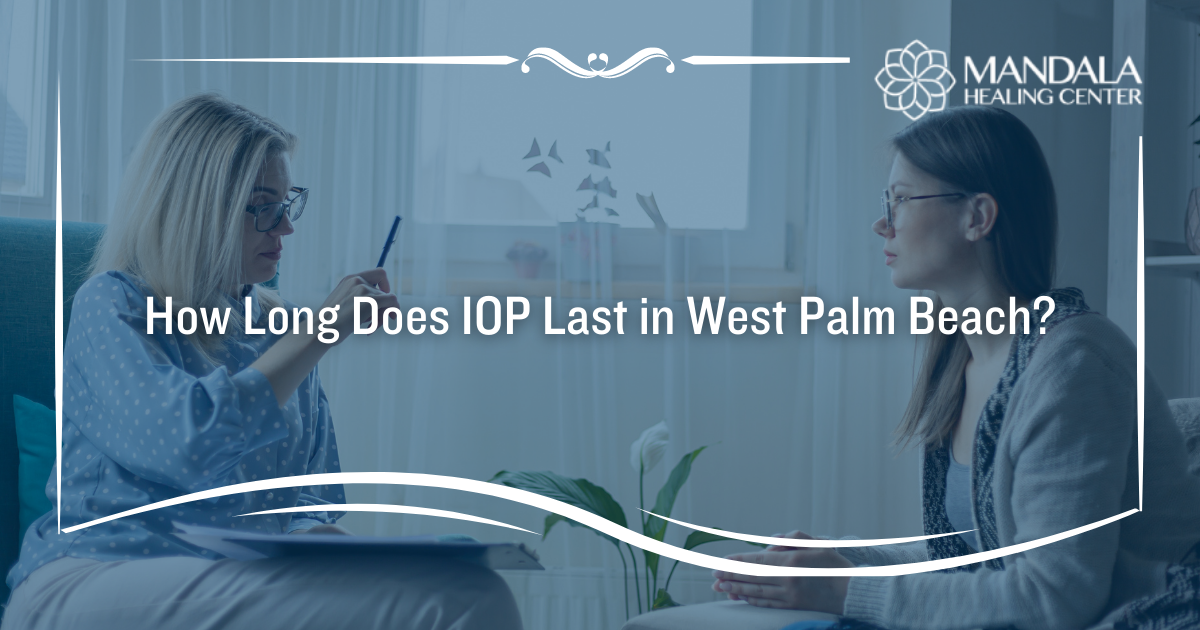Addiction is a chronic and progressive disease that requires extensive professional treatment. There are many different types of addiction treatment for you to choose from, with IOP programs being one of the most popular. IOP, or intensive outpatient programs, provide you with the same evidence-based addiction treatment practices as inpatient rehab, but with less supervision. In other words, IOPs are a less intensive form of inpatient treatment. Rather than living at the facility, you attend treatment sessions on-site and return home at the end of the day.
If you or a loved one are considering attending this type of program, you may be wondering how long IOP lasts in West Palm Beach. The length of an intensive outpatient program varies depending on your individual needs. Factors like your drug abuse history and whether you are diagnosed with co-occurring disorders play a role in how long rehab lasts.
How Long Should I Stay in Rehab?
While the length of rehab varies depending on your personal needs, research has found that longer programs provide better results.
According to the National Institute on Drug Abuse, “Generally, for residential or outpatient treatment, participation for less than 90 days is of limited effectiveness, and treatment lasting significantly longer is recommended for maintaining positive outcomes.”[1]
In other words, if you want to experience success in a rehab program you should plan to stay for at least 90 days.
You may be wondering why addiction treatment takes so long. Because of the physical and mental damage substance abuse causes, you will need time to adjust to sobriety, tackle the root causes of your addiction, and learn new coping mechanisms to use once you leave treatment.
How Long Do Most IOPs Last in West Palm Beach?
While 90 days is the recommendation, there are other options when it comes to the length of an intensive outpatient program. If you have previously completed a 30- or 60-day residential program, you may consider attending one of the shorter IOP options. Most IOPs in West Palm Beach last 90 days, however, let’s take a look at each program available to you.
30 Day IOP
The shortest IOP available is a 30-day program. When you decide to attend a 30-day program, an addiction expert will speak with you to determine your specific treatment plan. Typically, you will spend between 5-7 days attending treatment sessions at the facility. These sessions usually last about 3 hours per day.
60 Day IOP
60-day programs are best suited for individuals with mild addictions or as a part of the continuum of care. You may opt to start with a 60-day commitment and then reevaluate with your therapist to decide if staying for another 30 days would be beneficial. Like 30-day IOPs, you will most likely meet for 3 hours a day, anywhere from 5-7 days per week. However, the minimum amount of time IOP allows you to participate in therapy sessions is 9 hours per week (3 hours for 3 days per week).[2]
90 Day IOP
90-day programs are the standard when it comes to stand-alone IOP addiction treatment. As previously mentioned, this is the recommended amount of time for success in addiction treatment. While it is most common for people to use a 90-day program alone, you may decide to attend residential treatment beforehand. This would allow you ample time to create a strong foundation of recovery and build upon new healthy coping mechanisms.
Extended Care Programs
The last option is known as “extended care.” Addiction treatment centers in West Palm Beach offer this type of program for individuals who want to continue their treatment after their original program has ended. In other words, extended care is additional support offered by the treatment center for individuals who feel as though they need a little extra guidance. Extended care services include continued individual therapy, access to group counseling sessions, alumni meetings, and 12-step support.[3]
Factors That Influence the Length of IOP
Many factors influence how long IOP lasts. The length of IOP in West Palm Beach relies solely on your individual needs. This provides you with an individualized treatment plan consisting of treatment methodologies catered to your recovery.
The factors that influence the length of IOP include:
- Whether you experience withdrawal symptoms and require detox
- If you have co-occurring mental health disorders to address
- How long you were abusing drugs, how frequently, and what type
- Whether you have received treatment in the past and experienced a relapse
- How well you adjust to the treatment protocols
- Your level of participation during individual and group therapy sessions
Find an IOP in West Palm Beach Today
It is essential to find appropriate help if you or a loved one has been suffering from drug addiction or alcoholism. When you call Mandala, you will be connected immediately with one of our highly trained and knowledgeable Admissions Coordinators. They will work closely with you to learn about your unique story and what your specific needs are. Our Admissions Coordinator will also be available to explain our program, address any concerns, and answer any questions that you may have.
We understand that making arrangements to enter addiction treatment may feel confusing and stressful. Your Admissions Coordinator will make sure that as they guide you through the admissions process, your experience is simple and seamless. All calls and initial assessments are 100% free and confidential.
If you or a loved one require addiction treatment in West Palm Beach, Mandala Healing Center is here to help. Contact us today for more information on how to get admitted to our IOP program.
References:












